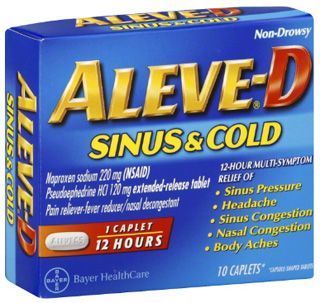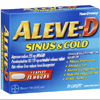  | Aleve is used to treat pain or inflammation caused by conditions such as arthritis, ankylosing spondylitis, tendinitis, bursitis, gout, or menstrual cramps. Active Ingredient: Naproxen Availability: In Stock (39 packages) View all Analogs of Aleve: Naprosyn |
| Product name | Per Pill | Savings | Per Pack | Order |
|---|---|---|---|---|
| 30 pills | $1.19 | $35.55 | ADD TO CART | |
| 60 pills | $0.96 | $13.57 | $71.10 $57.53 | ADD TO CART |
| 90 pills | $0.88 | $27.15 | $106.65 $79.50 | ADD TO CART |
| 120 pills | $0.85 | $40.72 | $142.20 $101.48 | ADD TO CART |
| 180 pills | $0.81 | $67.87 | $213.30 $145.43 | ADD TO CART |
| 270 pills | $0.78 | $108.59 | $319.95 $211.36 | ADD TO CART |
| 360 pills | $0.77 | $149.31 | $426.60 $277.29 | ADD TO CART |
| Product name | Per Pill | Savings | Per Pack | Order |
|---|---|---|---|---|
| 30 pills | $1.12 | $33.74 | ADD TO CART | |
| 60 pills | $0.91 | $12.88 | $67.48 $54.60 | ADD TO CART |
| 90 pills | $0.84 | $25.77 | $101.23 $75.46 | ADD TO CART |
| 120 pills | $0.80 | $38.65 | $134.97 $96.32 | ADD TO CART |
| 180 pills | $0.77 | $64.42 | $202.46 $138.04 | ADD TO CART |
| 270 pills | $0.74 | $103.07 | $303.69 $200.62 | ADD TO CART |
| 360 pills | $0.73 | $141.72 | $404.92 $263.20 | ADD TO CART |
INDICATIONS
Aleve (naproxen) is in a group of drugs called nonsteroidal anti-inflammatory drugs (NSAIDs). Naproxen works by reducing hormones that cause inflammation and pain in the body. It commonly used for the reduction of pain, fever, inflammation and stiffness caused by conditions such as:
- osteoarthritis
- kidney stones
- rheumatoid arthritis
- psoriatic arthritis
- gout
- ankylosing spondylitis
- menstrual cramps
- tendinitis
- bursitis
Aleve is commonly used for the reduction of pain, fever, inflammation and stiffness caused by conditions such as:
- osteoarthritis
- kidney stones
- rheumatoid arthritis
- psoriatic arthritis
- gout
- ankylosing spondylitis
- menstrual cramps
- tendinitis
- bursitis
INSTRUCTIONS
Take Aleve exactly as directed on the label, or as it has been prescribed by your doctor. Do not use the medication in larger amounts, or use it for longer than recommended. Do not crush, chew, or break an extended-release or enteric-coated tablet. Swallow the pill whole. The extended-release pill is specially made to release medicine slowly in the body. Breaking the pill would cause too much of the drug to be released at one time. The enteric-coated pill has a special coating to protect your stomach. Breaking the pill could damage this coating. Shake the oral suspension (liquid) well just before you measure a dose. To be sure you get the correct dose, measure the liquid with a marked measuring spoon or medicine cup, not with a regular table spoon.
If you take Aleve for a long period of time, your doctor may want to check you on a regular basis to make sure this medication is not causing harmful effects. Do not miss any scheduled visits to your doctor.Since Aleve is sometimes taken only when needed, you may not be on a dosing schedule. If you are taking the medication regularly, take the missed dose as soon as you remember. If it is almost time for your next dose, skip the missed dose and take the medicine at your next regularly scheduled time.
Do not use any other over-the-counter cold, allergy, or pain medication without first asking your doctor or pharmacist. Many medicines available over the counter contain aspirin or other medicines similar to Aleve (such as ibuprofen or ketoprofen). If you take certain products together you may accidentally take too much of this type of medication. Read the label of any other medicine you are using to see if it contains aspirin, ibuprofen, or ketoprofen. Do not drink alcohol while taking Aleve. Alcohol can increase the risk of stomach bleeding caused by Aleve. Avoid prolonged exposure to sunlight.
Aleve can make your skin more sensitive to sunlight, and a sunburn may result. Wear protective clothing and use sunscreen (SPF 15 or higher) when you are outdoors.
STORAGEStore Aleve at room temperature away from moisture and heat.
SAFETY INFORMATION
Before taking Aleve:
Taking an NSAID can increase your risk of life-threatening heart or circulation problems, including heart attack or stroke. This risk will increase the longer you use an NSAID. Do not use Aleve just before or after having heart bypass surgery (also called coronary artery bypass graft, or CABG).
NSAIDs can also increase your risk of serious effects on the stomach or intestines, including bleeding or perforation (forming of a hole). These conditions can be fatal and gastrointestinal effects can occur without warning at any time while you are taking an NSAID. Older adults may have an even greater risk of these serious gastrointestinal side effects.
Do not use this medication if you are allergic to Aleve, or if you have a history of allergic reaction to aspirin or other NSAIDs.
If you have any of these other conditions, you may need a dose adjustment or special tests to safely use Aleve:- a history of heart attack, stroke, or blood clot;
- heart disease, congestive heart failure, high blood pressure;
- a history of stomach ulcers or bleeding;
- liver or kidney disease;
- asthma;
- polyps in your nose;
- a bleeding or blood clotting disorder; or
- if you smoke.
FDA pregnancy category C. Before using Aleve, tell your doctor if you are pregnant or plan to become pregnant during treatment. Taking Aleve during the last 3 months of pregnancy may result in birth defects. Do not take Aleve during pregnancy unless your doctor has told you to. Aleve can pass into breast milk and may harm a nursing baby. Do not use this medication without telling your doctor if you are breast-feeding a baby. Do not give this medicine to a child younger than 2 years old without the advice of a doctor.
WARNINGS:
Do not use any other over-the-counter cold, allergy, or pain medication without first asking your doctor or pharmacist. Many medicines available over the counter contain aspirin or other medicines similar to Aleve (such as ibuprofen or ketoprofen). If you take certain products together you may accidentally take too much of this type of medication. Read the label of any other medicine you are using to see if it contains aspirin, ibuprofen, or ketoprofen. Do not drink alcohol while taking Aleve. Alcohol can increase the risk of stomach bleeding caused by Aleve. Avoid prolonged exposure to sunlight. Aleve may increase the sensitivity of the skin to sunlight. Use a sunscreen and wear protective clothing when exposure to the sun is unavoidable.
SIDE EFFECTS
Get emergency medical help if you have any of these signs of an allergic reaction: hives; difficulty breathing; swelling of your face, lips, tongue, or throat. Stop taking Aleve and seek medical attention or call your doctor at once if you have any of these serious side effects:
- chest pain, weakness, shortness of breath, slurred speech, problems with vision or balance;
- black, bloody, or tarry stools;
- coughing up blood or vomit that looks like coffee grounds;
- swelling or rapid weight gain;
- urinating less than usual or not at all;
- nausea, stomach pain, low fever, loss of appetite, dark urine, clay-colored stools, jaundice (yellowing of the skin or eyes);
- fever, sore throat, and headache with a severe blistering, peeling, and red skin rash;
- bruising, severe tingling, numbness, pain, muscle weakness; or
- fever, headache, neck stiffness, chills, increased sensitivity to light, purple spots on the skin, and/or seizure (convulsions).
Less serious Aleve side effects may include: - upset stomach, mild heartburn or stomach pain, diarrhea, constipation;
- bloating, gas;
- dizziness, headache, nervousness;
- skin itching or rash;
- blurred vision; or
- ringing in your ears.
This is not a complete list of side effects and others may occur. Call your doctor for medical advice about side effects.